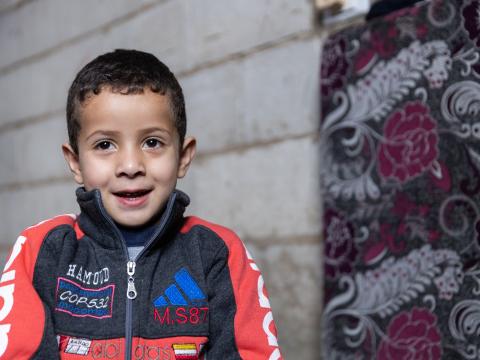Team work towards a promising future

Early childhood education is the building block in a child’s educational life. It lays the groundwork for the continuity of his/her education, and ensure a long term impact on learning.
But as much as education is important, having dedicated and understanding parents and teachers working together for the child’s well-being is a crucial factor during that process.
In line with World Vision Lebanon’s COVID-19 response plan, the Children in Crisis Approach, funded by World Vision, aims to respond to education and child protection needs of children and caregivers in Bekaa, South, and Akkar. This approach targets children through remote learning, integration of child protection activities and addressing stigma and discrimination, and caregivers through remote psycho-social support activities.
One year and nine months ago, Baraa's father disappeared. "We were all shocked, we looked everywhere for him. No one here saw him, nor did his family back in Syria", his mother, Moshira, explains. Baraa used to spend most of his time with his father. Since then, the four-year-old boy stopped talking and interacting with his mother and brother Hicham. At first, the mother did not understand what happened to her son, "he used to interact with us and liked to play with his brother, but not anymore,” she explains. It was not until Moshira enrolled Baraa in the remote early childhood education programme with World Vision, that she started to understand her son’s situation.
From the very first online session, Daleeda, his teacher, noticed this challenge and felt that it might be related to a specific condition at home. He had trouble expressing himself and even talking. Daleeda approached Moshira and asked about Baraa's situation. "I never knew that a child might be this affected by the circumstances, Daleeda explained it all to me", admits Moshira, "I always wanted the best for my children, and their education was my top priority.”
From that moment, the two women worked together to provide Baraa with all the necessary support to improve. “Daleeda went above and beyond to help my son. I truly appreciate the amount of time she dedicated particularly to him,” says the mother.
Feeling all this support and love that was poured into his education and wellbeing, Baraa start showing a lot of progress, "he began to interact during the online sessions, and his pronunciation progressed enormously", his teacher declares. “I could even sense the confidence while he is speaking now and that was missed before”. Moshira noticed Baraa’s evolvement as well, “he used to spend hours at home in front of the television watching cartoon without saying a word, just sitting there staring at the screen, but now Baraa started talking and expressing his admiration especially towards his favourite character Ben 10”.
Baraa is a child who needed a small push in the right direction, and this wouldn’t have been possible without the efforts of his mother and teacher. Baraa is one of many children struggling through today’s many difficulties. Nonetheless, the Children in Crisis Approach is changing the lives of 250 Syrian refugee children through remote early childhood education, 70 through remote basic literacy and numberacy, and 175 caregivers through remote psycho-social support.